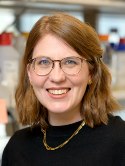Leveraging histone glycation for cancer diagnostics and therapeutics Review
| Authors: | Knörlein, A.; Xiao, Y.; David, Y. |
| Review Title: | Leveraging histone glycation for cancer diagnostics and therapeutics |
| Abstract: | Cancer cells undergo metabolic reprogramming to rely mostly on aerobic glycolysis (the Warburg effect). The increased glycolytic intake enhances the intracellular levels of reactive sugars and sugar metabolites. These reactive species can covalently modify macromolecules in a process termed glycation. Histones are particularly susceptible to glycation, resulting in substantial alterations to chromatin structure, function, and transcriptional output. Growing evidence suggests a link between dysregulated metabolism of tumors and cancer proliferation through epigenetic changes. This review discusses recent advances in the understanding of histone glycation, its impact on the epigenetic landscape and cellular fate, and its role in cancer. In addition, we investigate the possibility of using histone glycation as biomarkers and targets for anticancer therapeutics. © 2023 Elsevier Inc. |
| Keywords: | unclassified drug; genetics; review; nonhuman; drug targeting; antineoplastic agent; cancer diagnosis; neoplasm; neoplasms; metabolism; cell fate; tumor marker; cancer therapy; gene expression regulation; epigenetics; histone; chromatin; epigenesis, genetic; genetic epigenesis; phosphotransferase; histones; chromatin structure; molecular diagnosis; histone modification; glyoxalase; cancer therapeutics; post-translational modifications; humans; human; malignant neoplasm; protein deglycase dj-1; glycation; protein arginine deiminase type 4; dj 1 inhibitor; fructosamine 3 kinase; fructosamine 3 kinase inhibitor; glo1 inhibitor; pad4 inhibitor; histone glycation; maillard reaction |
| Journal Title: | Trends in Cancer |
| Volume: | 9 |
| Issue: | 5 |
| ISSN: | 2405-8025 |
| Publisher: | Cell Press |
| Date Published: | 2023-05-01 |
| Start Page: | 410 |
| End Page: | 420 |
| Language: | English |
| DOI: | 10.1016/j.trecan.2023.01.005 |
| PUBMED: | 36804508 |
| PROVIDER: | scopus |
| PMCID: | PMC10121827 |
| DOI/URL: | |
| Notes: | The MSK Cancer Center Support Grant (P30 CA008748) is acknowledged in the PubMed record and PDF. Corresponding author is MSK author Yael David -- MSK co-author Anna Knoerlein's last name is misspelled in the publication -- Source: Scopus |






